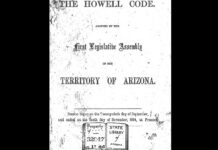
People record all sorts of public and private events for their social media accounts, family gatherings, sporting events, school plays, meetings, get-togethers, interviews, lectures and talks. If you want to record your experiences for your own enjoyment — or your own protection, that is your right and has been your right in Arizona since statehood.
If you call your doctor and record the call to make sure you have all the medical information correct and know exactly what to tell the pharmacist, you’re being a responsible patient. If you attend a contentious meeting online and record it because you want to be able to share with others what happened, you’re being a dutiful public citizen.
If you call someone on the phone you don’t exactly trust — a business acquaintance, a soon-to-be-ex-spouse in a divorce, a neighbor with whom you’ve been arguing, the boyfriend of your daughter you think is cheating on her, an elected official or government worker who is telling all sorts of mistruths — you might decide to record it and, if you’re doing so, you’re just covering your butt in case things go sideways or others lie about what was said.

The absurd House Bill 2038 is being sponsored by Arizona Rep. David Cook [R-District 7], a rancher from Pinal County who wants to criminalize these recordings and send you to jail for up to 18 months.
Only 11 states have two-party notification requirements, most notably California, while the other 39, Arizona included, match federal law and are one-party states, meaning only one person needs to be aware of the recording.
Up until now, Cook is best known for denying the results of the 2020 presidential election and for denying that his close ally, Kari Lake, lost the 2022 election for Arizona governor. While in-person recordings wouldn’t be illegal — yet — Cook told the Arizona Capital Times he’s in favor of expanding this law — “as far as he’s concerned, taping someone in person without their knowledge is as unacceptable as doing it by phone.”
What’s also scary is that this bill expressly targets journalists in Arizona. By practice, we identify ourselves as journalists when we call someone for an interview. We generally record interviews, both in person and over the phone, because it makes it easy for us to record exactly what sources say, verbatim, and gives us a permanent record of that interview. We even use software — Otter.ai is great — to transcribe these interviews quickly because most new journalists don’t take shorthand they way we older ones were taught in the days of notepads and rotary phones.
Nine times out of 10, we tell the people we’re speaking with that we’re also recording, but if we don’t or forget to, it’s understood that everything said is on the record, either recorded by a device or by a reporter with an eidetic memory for possible use in a story — unless, of course, the source declares some parts of the subsequent conversation “off the record,” which we are bound to not report on by practice and our Society of Professional Journalists’ Code of Ethics.
So if a mayor, county supervisor, governor or senator says something newsworthy, we have it on tape. If they come back later and say “I never said that,” we can share the recording with them, and with the public if necessary, to show “you said that at time index … ” It covers our butts, too.

Under this law, if an elected official denies a journalist the federal right to record an interview, and we proceed anyway, and they then admit to committing crimes and stealing public funds, it becomes our word against theirs — and there’s nothing we can do to prove they actually said what they actually said without breaking this new state law. With a recording in hand, we can share with readers, “These are his exact words, in his voice, saying these things. Listen for yourself here … ”
It also protects officials from misquotes. We’ve had plenty of stories where a reporter hears something by mistake, and when we go back to the recording, we can fact-check what they actually said before the misquote hits the page or the broadcast. Without a recording, it’s our word against theirs, and, well, we print copies in the tens of thousands. Many broadcast stations also specialize in “hidden camera” stories, which could become illegal, meaning officials could lie and businesses could defraud customers with impunity.
Cook wants politicians like himself to be able to get off the hook if they tell a journalist, or even you, a member of the public with a smartphone, about corruption. And if you release that recording, you can go to jail.
One exception: Police.
Odd, considering that the Arizona state trooper who arrested Cook for extreme DUI in 2018 reportedly recorded him saying, “Do you know what you’re doing, son? You’re making a mistake … you’ll get yours.”
You’d think he’d want to make police recordings illegal, too. But the Pinal County Attorney’s Office wanted the exception. So the government can still record you without your permission or a warrant and deny that right to every other Arizonan, including those who want to record an interaction for their legal protection. Recordings are OK for prosecution, but not your defense.
Arizona Rep. Quang Nguyen [R-District 6], Arizona Rep. Selina Bliss [R-District 6] and Arizona Sen. Ken Bennett [R-District 6] did not respond last week to our inquiries about how they plan to vote on the bill.
We urge them to vote “no.”
Call them and do the same, or click the links above to send them an email.
It is the right of every human being to record their experience for their own memories, protection or any other reason they see fit. Your experiences in the world, especially in public spaces, parks, government buildings or private events are yours. You don’t need the government or anyone else’s permission to record those moments for yourself, your family, your friends — or for your protection.
Christopher Fox Graham
Managing Editor


















